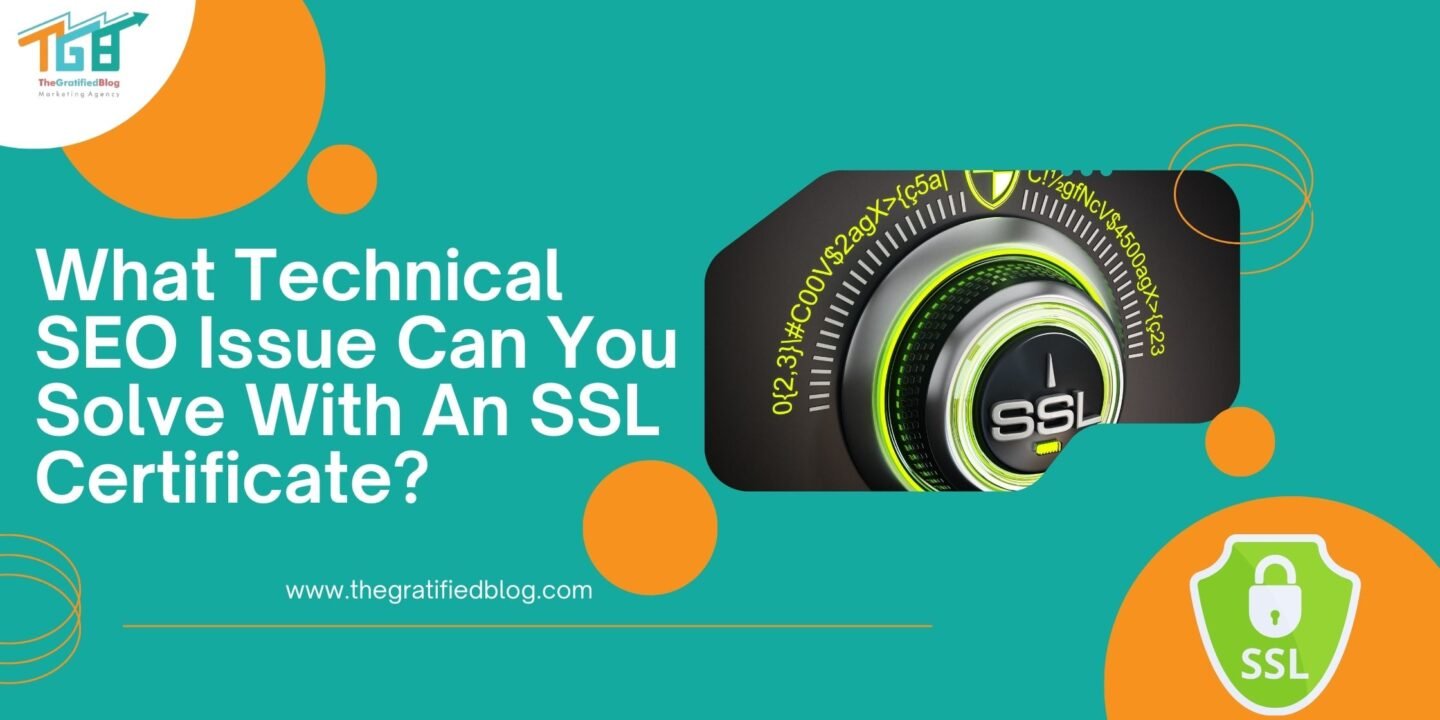
“What technical SEO issue can you solve with an SSL certificate? Maintaining a competitive edge is crucial in the ever-evolving landscape of digital marketing. In search engine optimization (SEO), technical SEO plays an essential role in ensuring your website attains a favorable ranking on search engines, and one often overlooked tool in your SEO arsenal is the SSL certificate.”
This extensive guide will delve into the realm of SSL certificates and What technical SEO Issues you can solve with an SSL certificate.
What Is An SSL Certificate?
An SSL (Secure Sockets Layer) certificate is a digital certificate that creates a secure link between a web server and a user’s web browser. It ensures that data transmitted between the two is encrypted and secure, providing confidentiality and integrity for sensitive information like login credentials, personal data, and payment details.

SSL certificates also validate the website’s authenticity, assuring users that they connect to a legitimate site rather than a fraudulent one. They are a fundamental component of web security and are commonly used to enable HTTPS (HyperText Transfer Protocol Secure) on websites.
What Technical SEO Issue Can You Solve With An SSL Certificate?
You can solve the technical SEO issue of “non-secure website” warnings by implementing an SSL certificate, securing your website (HTTPS), and improving your SEO rankings.

An SSL certificate can solve several technical SEO issues, making it a crucial component of your website’s search engine optimization strategy. Here are the main technical SEO issues that an SSL certificate can address:
- Improved Website Security
Website security is a paramount concern for search engines like Google. They prioritize user safety and privacy, and insecure websites can negatively impact the user experience. SSL certificates help address this issue by encrypting data, ensuring that sensitive information such as login credentials and payment details remains confidential. This improved security can boost your website’s credibility in the eyes of both search engines and users, positively impacting your SEO rankings.
- Enhanced User Trust
SSL certificates offer visual indicators to users indicating that your website is secure. When a website has an SSL certificate, browsers display a padlock icon in the address bar and “https://” indicating a secure connection. This visual reassurance builds trust among visitors, making them more likely to interact with your site. When visitors have confidence in your site, they are more inclined to prolong their stay, interact with your content, and potentially convert these factors, indirectly influencing your SEO rankings.
- Google’s SSL/TLS Requirement
Google has been actively pushing for a more secure web. In 2014, they announced that they would consider HTTPS a ranking signal. While the impact on rankings may not be dramatic, it’s still a factor that search engines consider. Google also flags websites without SSL certificates as “Not Secure” in its Chrome browser, which can deter users from visiting your site. By complying with Google’s SSL/TLS requirement, you can avoid potential SEO penalties and maintain a positive user experience.
- Mobile Compatibility
Mobile-friendliness is a crucial aspect of SEO since it increases users’ access to websites on mobile devices. SSL certificates are compatible with desktop and mobile browsers, ensuring a consistent and secure user experience across all platforms. This mobile compatibility contributes positively to your SEO efforts, as search engines favor websites that cater to mobile users.
- Reduced Bounce Rates
The bounce rate percentage of the bounce rate refers to visitors who exit your site after viewing just one page, another SEO metric that SSL certificates affect. A secure website is less likely to scare away visitors, reducing bounce rates. When users feel safe and confident in the security of your site, they are more likely to explore multiple pages, engage with your content, and ultimately boost your SEO performance.
- Faster Loading Times
SSL certificates can also contribute to faster website loading times. Google considers page speed when determining the ranking of sites. While SSL encryption may slightly slow down a website, modern SSL certificates and server optimizations can minimize this impact. In addition, some content delivery networks (CDNs) offer SSL acceleration, which can further enhance your website’s speed. A faster-loading site not only improves SEO but also enhances the user experience.
- Preventing Duplicate Content Issues
SSL certificates can help prevent duplicate content issues caused by multiple versions of your site being accessible through both HTTP and HTTPS. Search engines may consider a page’s HTTP and HTTPS versions as duplicate content, which can lead to SEO ranking problems. By implementing an SSL certificate and redirecting all traffic to the HTTPS iteration of your site, you can mitigate this problem and uphold a clean SEO profile.
- Earning Referral Traffic
Websites with SSL certificates attract more referral traffic. Secure websites are more likely to be linked to other sites and shared on social media, as web admins and users prefer to connect to and share trustworthy sources. This increased referral traffic can boost your website’s authority and SEO rankings.
- Compliance with Regulations
Regulations concerning data protection, like the General Data Protection Regulation (GDPR) in some regions, require websites to secure user data. Failure to adhere to these regulations could result in penalties and legal issues. By implementing SSL certificates and ensuring data security, ensure adherence to these regulations and prevent potential SEO penalties that could arise from non-compliance.
- Competitive Advantage
Lastly, SSL certificates can provide a competitive advantage in your industry. Users will expect a secure browsing experience as more websites adopt SSL encryption. By staying ahead of the curve and securing your website with an SSL certificate, you demonstrate your commitment to user safety and remain competitive in the digital landscape.
Relationship Between SSL And SEO
The relationship between SSL (Secure Sockets Layer) and SEO (Search Engine Optimization) is significant, and SSL can impact your website’s SEO in several ways:
- Ranking Signal: Google, the most popular search engine, uses HTTPS (the secure version of HTTP enabled by SSL certificates) as a ranking signal. Websites with SSL certificates rank higher in search engine results pages (SERPs) than non-secure websites. An SSL certificate can improve search engine rankings, potentially increasing organic traffic.
- User Trust: SSL certificates display visual cues in web browsers, such as a padlock icon and “https://” in the address bar, indicating a secure connection. These cues build trust with users, ensuring their data is safe when interacting with your website. This trust can lead to higher click-through rates (CTR) and longer time spent on your site, which are positive signals for SEO.
- Reduced Bounce Rate: Secure websites are less likely to scare users away due to security warnings. If a user encounters a “Not Secure” warning on a website, they may bounce back to the search results, potentially harming your bounce rate. Lower bounce rates are generally seen as a positive SEO signal.
- Enhanced Mobile Experience: As mobile devices play a crucial role in web traffic, Google prioritizes mobile-friendly websites. SSL certificates contribute to a secure and smooth mobile browsing experience, which can improve mobile SEO rankings.
- HTTPS as a Tiebreaker: HTTPS can serve as a tiebreaker in cases where websites have similar SEO factors. Google may favor the secure website over the non-secure one in such situations.
- Security Against Negative SEO: SSL can protect your website from negative SEO tactics, such as negative SEO attacks where malicious entities attempt to harm your site’s rankings. Having SSL in place can make it more difficult for attackers to exploit vulnerabilities.
Importance Of SSL Certificates In Modern Web Development
SSL (Secure Sockets Layer) certificates play a crucial role in modern web development for several reasons. They are an integral part of web security and user trust. Here are some key reasons why SSL certificates are essential in modern web development:
- Encrypt data for security.
- Build user trust with visual indicators.
- Improve SEO rankings.
- Protect against phishing.
- Meet compliance requirements.
- Enhance website performance.
- Provide authentication.
- Ensure mobile compatibility.
- Enable global accessibility.
- Prevent man-in-the-middle attacks.
FAQs
Q. Can I Get An SSL Certificate For Free?
Some trusted Certificate Authorities (CAs) offer free SSL certificates, such as Let’s Encrypt. Many hosting providers also provide free SSL certificates as part of their hosting packages.
Q. Do I Need To Renew My SSL Certificate, And Can An Expired Certificate Harm My SEO?
Yes, SSL certificates typically need to be renewed periodically. An expired certificate can negatively impact your SEO because it will make your website more secure, which may lead to lower search rankings and loss of user trust.
Conclusion
SSL certificates are not just about security; they are vital in addressing various technical SEO issues. From improving website security and user trust to complying with search engine requirements and enhancing mobile compatibility, SSL certificates are versatile in your SEO toolbox. Investing in an SSL certificate protects your users’ data, boosts your website’s SEO performance, and maintains a leading position in the competitive digital landscape.
So, don’t delay; secure your website with an SSL certificate today for a safer, more SEO-friendly online presence.








No Comments